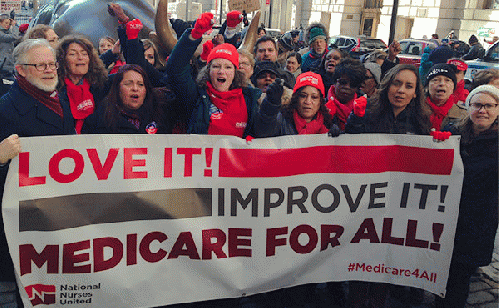From Smirking Chimp
By Kevin Zeese and Margaret Flowers
State-level reforms for universal health care are laudable; they are not single payer.
Two states with a long history of state-based healthcare reform efforts, California and New York, are hard at work organizing for state bills labeled as single payer healthcare plans. Other states are moving in that direction too. This raises questions by single payer advocates: Can states create single payer healthcare systems? Does state-level work help or hinder our goal of National Improved Medicare for All (NIMA)?
The movement for NIMA gained momentum throughout 2017, largely due to rising premiums under the Affordable Care Act (ACA) and Republican efforts to worsen the healthcare crisis. Supporters of NIMA mobilized to build support for single payer legislation in Congress, spoke out at Town Halls and pressured lawmakers. As a result, the House bill, HR 676: The Expanded and Improved Medicare for All Act, grew to 120 co-sponsors, the highest number in its 15-year history, and Senator Sanders was successfully pressured to introduce a bill in the Senate, S 1804: The Medicare for All Act.
As momentum grew, the expected push back materialized. In the spring, Democrats in Congress urged people to focus on fixing the ACA and uttered support for various forms of a public insurance, a "public option" or Medicare buy-in. In August, well-known progressives, claiming to be "single payer supporters," published articles arguing that single payer was too much to ask for and outlining "incremental approaches."
Members of Congress, including Speaker Nancy Pelosi, complained about Democratic voters making single payer a litmus test in the next elections. Pelosi said, "So I say to people, if you want [single payer], do it in your States. States are laboratories." The message was clear, there was too much pressure for NIMA and Democrats didn't like it. Sending people to work at the state level would lower the heat on Congress
State Efforts for Universal Health Care
Canada is often pointed to as a model for achieving National Improved Medicare for All in the United States. A universal medical insurance was first created in the province of Saskatchewan in 1962, following decades of increasing socialization of medicine in several provinces and a national law that financed universal hospital coverage at the provincial level. By 1968, a universal publicly-financed Medicare program was adopted nationally. Could the same path occur in the US?
The twenty-first century healthcare system in the United States is much more complex than the Canadian system was in the 1960s. At that time, health care was left up to the provinces. Dr. Don McCanne writes, "We cannot use the example of Saskatchewan and pretend that a state can set up a single payer system that could serve as an example for the nation -- a model that could be expanded to all states. No. Saskatchewan began with a tabula rasa. They were able to create a de novo single payer system."
Rather than socializing medicine, the US has experienced decades of increasing privatization. There are a multitude of payers in the US, which include private insurance through employers, unions and individually, public programs, and national programs for federal employees and the military. A state would have to succeed in obtaining multiple waivers from the federal government and changes to federal laws to enact a state-based program. One federal law, the Employee Retirement and Income Security Act of 1974 (ERISA), which prohibits states from regulating employee benefits, is a major obstacle. States also face the hurdle of being required to balance their budgets, a barrier that doesn't exist at the national level.
As outlined in Public Citizen's "Roadmap to Single Payer," a state can potentially make its healthcare system more efficient, but it cannot achieve a pure single payer system; thus, it can't attain the bulk of savings that a single payer system would have. Within their budget constraints, states would be forced to raise the costs to individuals and businesses or lower coverage if they are not able to meet their needs for care. This has happened in every past attempt by states to achieve universal coverage, as Drs. Steffie Woolhandler and David Himmelstein document in "State Health Reform Flatlines."
If a state were able to pass a bill outlining a path toward a universal healthcare system and to be granted a federal waiver from the Affordable Care Act (ACA), which are major feats, the state would still face significant barriers, some of which make it impossible to create a pure single payer program.
Barriers to state single payer
1. Federal health plans -- There are numerous federal health plans, such as Medicare for seniors and those who qualify for disability, the Federal Employee Health Benefits Program (FEHBP), which includes over 200 plans, the Veterans Health Administration (VA), the Indian Health Service (IHS) and Tri-Care for members of the military; it is not possible to merge all these programs into a single state system.
(Note: You can view every article as one long page if you sign up as an Advocate Member, or higher).





